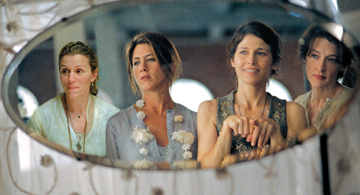 Frances McDormand, Jennifer Aniston, Catherine Keener, and Joan Cusack reflect in an expensive mirror and on their lives as ‘Friends With Money.’
Frances McDormand, Jennifer Aniston, Catherine Keener, and Joan Cusack reflect in an expensive mirror and on their lives as ‘Friends With Money.’
|
| Friends With Money\r\nStarring Jennifer Aniston, Joan Cusack, Catherine Keener, and Frances McDormand. Written and directed by Nicole Holofcener. Rated R. |
|
A D V E R T I S E M E N T
|
|
|
|
A D V E R T I S E M E N T
|
|
Pay Pals
Having Friends With Money solves no problems in this flawed, enjoyable comedy.
By KRISTIAN LIN
We need to declare Nicole Holofcener a national treasure of some kind. Whereas the pictures Hollywood churns out for women are gooey and insipid, the comedies she writes and directs are funny, bruising, fiercely intelligent, and sympathetic to their female characters without being afraid to depict them as less than gosh-darned likable. Because of this, they achieve an honesty that the makers of Failure to Launch couldn’t possibly imagine. Holofcener hasn’t gotten nearly the recognition she deserves, no doubt because Friends With Money is only her third film in 10 years. This movie should raise her profile, since it has the starriest cast she has ever worked with (eight Oscar nominations here). I wish it were her best film yet, but it’s not. It has weaknesses that weren’t evident in her previous entry, 2002’s potent Lovely & Amazing. Even so, it’s pretty good stuff about a subject that light comedies don’t usually touch.
It’s about four longtime female friends in southern California. Christine, Franny, and Jane (Catherine Keener, Joan Cusack, and Frances McDormand, respectively) are all married with at least one kid, and they’re all rich, either by their marriages or their jobs. The odd woman out is Olivia (Jennifer Aniston), who’s still single and scraping out a living, hiring herself out to clean people’s houses. The others worry about her, especially with her horrible track record with boyfriends. The situation’s worse than they know; Olivia’s such a sad case that she periodically calls up an ex who’s now married, just to listen to his voice, and involves herself with Franny’s personal trainer (Scott Caan), who’s a total assclown. Late in the film, Franny reflects that if she had recently met Olivia, they probably wouldn’t be friends.
Usually when movies talk about rich and poor, it’s in broad strokes. Here money rears its head whether the subject isn’t talked about — as when Olivia goes silent when her friends talk about pricey day-care and food items — or when it is. When Olivia asks Franny for a loan to help her become a licensed personal trainer, Franny first raises an obvious point (“But you hate exercise”), attaches strings to the money (“I’d feel better if you got some therapy”), gets chewed out for buying her young daughter $80 shoes (Olivia doesn’t know that Franny’s husband insisted on the shoes), and finally asks Olivia if she’s trying to lay on a guilt trip. The hesitant response: “No, I don’t think.” This complex, layered scene is terrifically funny and typical of the way the movie works.
Olivia is the key to the proceedings; her fate is supposed to give the movie its emotional oomph. Instead, the character is the weak link, partly because Aniston totally misses the desperate loser vibe that the part needs. That statement may sound odd if you’ve seen The Good Girl, but Olivia is different because she’s completely clueless. (Indeed, Holofcener’s conception of this zero-self-esteem character seems to be a bad fit with both the actress and the rest of the film. A more resourceful Olivia would have strengthened the movie’s class critique.) By comparison, Keener makes it perfectly credible that Christine is smart but unable to see certain things from others’ point of view (literally so, in the case of the second floor that Christine and her husband are adding to their house, which has their neighbors royally pissed). Aniston’s sitcom experience serves her well when she’s bantering with her high-powered co-stars, but she really needed to see Paul Giamatti in Sideways to get a handle on this character.
The movie’s also sketchy on its various marriages, with none of the three wives having a particularly credible relationship. Christine and her husband (Jason Isaacs) are badly matched, though they have a memorable exchange when he casually tells her that her ass is getting fat, and she tries and fails to get back at him. (This is part of a weird pattern in Holofcener’s movies: Men always win the arguments because they’re more insensitive and passive-aggressive.) Meanwhile, Jane and her husband Aaron (Simon McBurney) barely seem to operate in the same universe, though Aaron has a running gag in which everybody who meets him thinks he’s gay.
That gag is good for many more laughs than it should be, partly because Holofcener structures the story idiosyncratically so that you don’t realize it’s a running gag until Aaron meets the one guy who doesn’t think he’s gay. While her script doesn’t boast as many quotable one-liners as Lovely & Amazing, it still has many rewarding comic situations, such as Olivia’s attempts to scam free face cream from department stores. Whenever the proceedings need a jolt, McDormand is happy to oblige as Jane, a successful clothing designer with serious anger-management problems — a whole other movie could be centered around her. Her unsettling fits of rage help remind us that whatever its shortcomings as sociological study or well-wrought drama, Friends With Money is completely enjoyable to watch because it provides its high-powered stars with smart, engaging material. If Hollywood were a better place, it would turn out more movies like this.
 Email this Article...
Email this Article...

